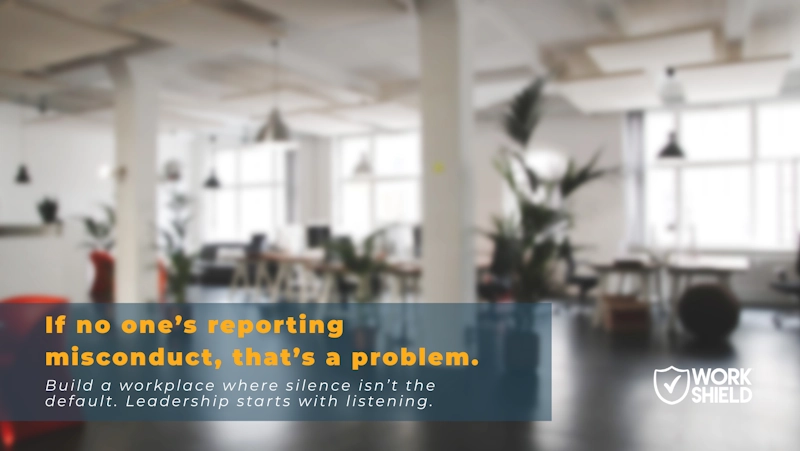Conducting transparent and fair misconduct investigations is essential to maintaining trust within an organization. The internal investigation process often carries unintentional biases, which can erode confidence and deter employees from reporting concerns. By leveraging unbiased third-party solutions, HR and legal teams can streamline the investigation process, provide swift resolution recommendations, and create an environment where employees feel safe and supported in coming forward.
Swift and impartial resolution recommendations are critical to mitigating the financial, legal, and reputational risks associated with workplace misconduct. When organizations prioritize unbiased investigations and provide timely resolutions, they demonstrate a commitment to integrity and transparency. This not only builds employee trust and confidence in leadership but also reduces the likelihood of escalation, such as prolonged conflicts or litigation. By streamlining the investigative process, organizations can maintain productivity, minimize disruptions, and foster an environment where employees feel respected, valued, and empowered.
Unbiased Investigations for Fair Resolutions
Conflicts of interest, inconsistencies, and bias can undermine the internal investigation process, eroding trust and leaving issues unresolved. When internal teams such as HR or management conduct the investigations, employees may hesitate to report misconduct due to concerns about impartiality or fear of retaliation.
To address these challenges, a third-party, unbiased solution, such as Work Shield, can be a great benefit. Having a third party take on the reporting and investigation process not only relieves the stress on internal human resources professionals but also removes the potential for bias. The U.S. Equal Employment Opportunity Commission (EEOC) reinforces the importance of impartial and thorough investigations in its guidance on harassment in the workplace. The EEOC notes that effective investigations should be conducted by a trained and impartial investigator to ensure fairness and foster trust.
While the misconduct investigation process can often be challenging, employers who prioritize a compliant workplace create an environment where all parties involved feel heard and respected. With only 25% of U.S. employees feeling strongly that their organization cares about their well-being, it’s clear that change is necessary. By building impartiality into the investigative process, organizations not only rebuild trust and transparency but also establish a foundation for long-term employee engagement and organizational success.
Reduce the Fear of Retaliation
In the workplace, employees can quickly learn how much upper management values a positive work environment by how they view and address misconduct. If misconduct is frequently left unaddressed, employees may be reluctant to report it for fear of retaliation, which may include consequences such as job loss, demotion, or further negative treatment. A study found that 43% of employees fear retaliation if they were to speak up. This concern is substantiated by the EEOC, which reports that retaliation is the most frequently cited claim in charges filed with the agency, accounting for 55.8% of all charges in fiscal year 2020.
Organizations with inadequate mechanisms for addressing misconduct risk significant financial and reputational harm, including challenges retaining top talent. Work Shield’s comprehensive third-party platform streamlines the process from reporting to resolution, fostering trust and encouraging open communication. By providing a secure and impartial system for all parties, Work Shield helps create a safer, more supportive, and productive workplace environment.
Prompt Resolutions for a Safer Workplace
It’s no secret that misconduct can often be difficult and uncomfortable for all parties involved. Therefore, when employees are tasked with investigating allegations, providing a prompt investigation and resolution is essential. The EEOC underscores the importance of prompt investigations as a critical component of addressing workplace misconduct effectively. According to the EEOC, delays in resolving complaints can exacerbate tensions, lead to further misconduct, and increase the risk of legal liabilities.
If prolonged, there can be unfavorable employee impacts, such as a loss in productivity, but there can also be further legal complications, reputational damage, or unresolved issues that can escalate. In fact, this loss in productivity can cost an estimated $300 billion for U.S. organizations each year. For example, in a notable EEOC case, an employer faced heightened penalties because of delays in investigating and addressing allegations of harassment, which ultimately allowed the misconduct to continue. This case highlights how failing to act promptly not only harms employees but also exposes organizations to significant reputational and financial risks.
When employee misconduct investigations and resolutions are conducted swiftly, it can improve employee trust, reduce stress, and minimize operational disruptions. By addressing misconduct swiftly, organizations can reduce these risks, restore trust, and foster a workplace environment of compliance and safety.
Consistency and Accountability with Work Shield
Work Shield’s ability to deliver consistent, data-driven outcomes directly addresses the challenges outlined by the EEOC, including the need for prompt, impartial, and thorough investigations. By streamlining these processes, Work Shield enables HR professionals and employees to report misconduct 24/7—anonymously or non-anonymously—through its secure platform. This not only eliminates delays that could exacerbate tensions and legal risks but also promotes that investigations are free from internal bias or conflicts of interest.
Organizations that embrace Work Shield’s comprehensive approach can align with EEOC best practices, fostering a culture of accountability and transparency. By empowering employees to report issues without fear of retaliation and resolving cases swiftly, organizations can reduce risks, rebuild trust, and promote a safer, more compliant workplace.





